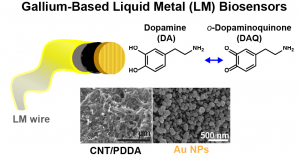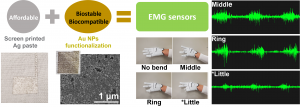Gallium Based Bioelectronics
Bioelectronic devices often require soft, stretchable, and reconfigurable material properties to interact with the soft tissues in the biological system and curvilinear skin in the dynamic system. Gallium (Ga) and its alloys, called liquid metals, are recognized as a promising bioelectronic material due to their extremely low mechanical stiffness at near body temperature, low toxicity, negligible vapor pressure, and excellent electrical conductor. Our research focuses on how gallium interact with biological systems and design high-performance and biostable gallium based bioelectronic

Nanocomposite based Wearable Electronics
Wearable biosensors have received significant attention due to the possibility to measure physiological signals on demand. Particularly, the monitoring of electromyographic (EMG) signals on demand by wearable platforms have the significant potential to revolutionize the diagnostics and treatment of neuromuscular disease and advancing human-computer interface. Our group focus on design biostable and high electrochemical interface on wearable electronics


